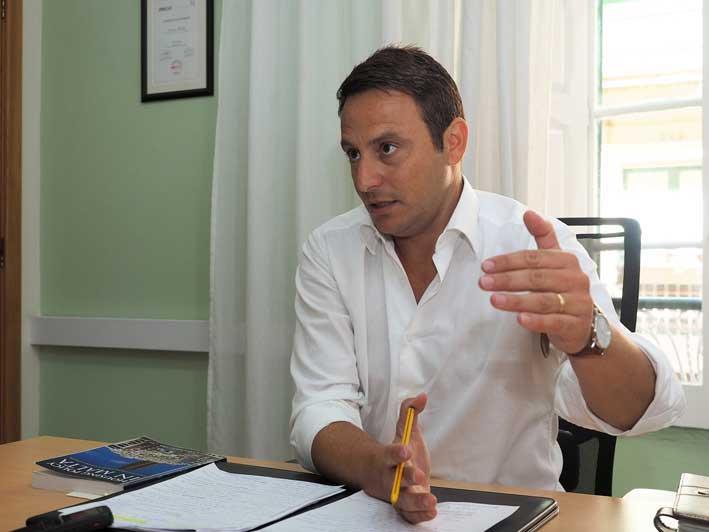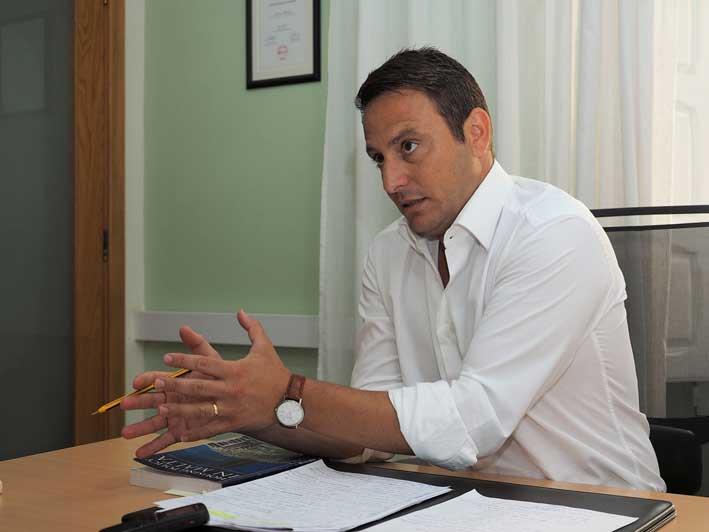You were with Caritas for 12 years; what are your feelings, having left for this new job?
I was Director for four of those 12 years, and leaving was a very difficult decision. My experience there brought me much closer to people, which was one of my main aims - to make people the centre of our work at Caritas.
One of our major achievements was that we succeeded in this, and that we were the voice of the most vulnerable. Our motto was 'Be on the side of people in need'.
We also strengthened a number of services. We opened Dar Papa Franġisku and Dar Maria Dolores, which are emergency shelters, and also drafted the minimum essential budget for a decent living, which aimed at setting a policy benchmark for low-income earners, helping the policy-makers focus on this section of society. Through this, the campaign to revise the minimum wage was launched.
As a team, we became a major stakeholder, and policy-makers wanted the Caritas perspective on budgets, etc. We did not just want to be associated with drug rehabilitation but also wanted to discuss issues affecting vulnerable people at the centre of our work.
Caritas also underwent a restructuring of its rehabilitation services, with a focus on aftercare. 'Aftercare' is the phase after a person has successfully concluded the residential rehabilitation programme. This has been a main focus over the past four years and we have just opened Dar Charles Miceli to deal with follow-ups for post-residential care.
We oversaw a restructuring of the rehab programme for women and the highest number of women with drug problems seeking help was recorded in 2017. This was the result of an ongoing restructuring of the San Blas rehab programme.
A more recent Caritas project will see work begin on 3rd September (the day I officially take up the position of Housing Authority CEO) on the programme for adolescents at Ta'Kandja, because at present we only have services for people aged over 18, and this project will change that. The government will be providing the capital for its construction and also the operational funds.
Something really close to my heart was the Christmas lunch for lonely people. These were the major projects undertaken by Caritas recently, but the one thing I am really proud of is that I managed to uphold the legacy of Mons. Victor Grech and I have no doubt that my successor, Anthony Gatt, will do the same.

Is there an issue you wanted to tackle but weren't able to - something you would recommend your successor to take on?
Yes - the creation by Caritas of a centre to house all the various community services in one place, such as those dealing with usury, social work and the drug outreach unit - a Caritas Community Centre. The project has not yet started, but the plans are already in place and it is something on which my successor will definitely be working.
What made you take up the job at the Housing Authority?
I see it as a continuation of my work at Caritas, where I had the privilege to meet many people who also needed to knock on the door of the Housing Authority, and to understand their reality. The Authority has an extremely important role in society and I see my new job as an extension of my 12 years at Caritas. And now, as a result of all the various encounters I've had over the years, I have the tools to deal with situations.
In addition, in 2012 I graduated with a Master in social policy, and my thesis focused on social housing and urban sprawls. My focus in my Master degree studies relates to a geographical mapping as to where the largest concentrations of the disadvantaged and low income earners reside.
So essentially my experience academically and professional elements were the main factors which helped me take this decision. Housing is a very important policy area and so with humility and full of energy I intend to contribute to society in the name of the authority.

12-years at Caritas: how has the drug scene changed since you first started?
My information is based on the people who knocked on the door of Caritas between 2006 and 2017, and we have seen a dramatic change. There were a lot more heroin users knocking on our doors in 2006, and they were the absolute majority. Fast forward 11 years and while heroin users still account for the largest number of our patients, there are now quite a few people with cocaine and cannabis dependency. So the heroin problem is still there, but the cocaine and cannabis problems have increased.
These trends reflect EU trends. Fortunately, there is a very extensive number of services, including detoxification, a number of therapeutic communities such as Caritas, OASI and Sedqa - all offered free of charge, and a number of aftercare services and rehab service in prison. Apart from the difference in substance use, today there are more women requesting to make use of Caritas services. While 80 per cent are still men, the number of women is increasing and women are staying longer in the rehabilitation programmes.
In 2017, Caritas had 658 clients - 27 per cent more compared to 2004. However, from 2006 onwards the number of outreach clients has been in the region of 614 (minimum) to 694 (maximum). The most common age for those seeking treatment has been 33.
In addition, the Drug Dependency Act that was introduced a few years ago brought about a large change in the way in which we perceive people who have a dependency on drugs. Today we are looking at drug users more as people who need help and less as criminals.
We hear a lot more about drug busts than we used to. Do you believe that the amount of drugs on the streets is increasing or is this due to better police work?
I can only speak about the demand for treatment at Caritas. The number of people knocking on our doors has generally remained the same over the years.
We have had stability in terms of numbers.

How has homelessness developed over the years?
I can really only talk about the last three years, since we opened Dar Papa Frangisku in collaboration with the Government and The Alfred Mizzi Foundation, which offers free lunch to anyone who knocks on the door, be they people with financial problems, or people who are lonely. Apart from this, there has been government financial support and we wanted to offer a night shelter in addition to this service. We need to make a distinction between homelessness and rooflessness.
With regard to homelessness - and this is what we are talking about - if you really want to understand the situation in Malta you must not only look at housing stock, which is secondary, but at our welfare model. This model is similar to those in Mediterranean countries, where the stakeholders are not just the benevolent state, but the family which is the major component of the provision of care, the church and NGOs. The Maltese model is based on a mix of these sources of welfare.
To understand homelessness, you need to understand the relationship between the changes in the strong family ties, community cohesion and the welfare state. Anyone who thinks that homelessness has increased due to rent challenges is not correct. We confirmed this as Caritas from Dar Papa Frangisku. The service users of this home are mainly substance users who were not in a residential programme but still live on the street, people who have mental health issues - who could still be in care or have been in the past and for them such care is their security, and many women ending up on the street due to domestic violence and abuse - abuse even when they were young - and migrants (EU and third country nationals) who make up around half of this population.
These are the types of people who knocked on the door of this shelter and its sister home. If you want to understand homelessness, you need to understand the erosion of community life, of social ties and of family. The role of the family in the provision of care is lessening, and many of these people do not have social ties on which to rely. Further studies on this need to be carried out.
Other people who would knock on these doors were not the long-term chronic homeless, but those who needed temporary shelter - including victims of violence, or abuse and those living in institutional care.
Wouldn't this indicate that rent prices are the problem?
I'm not saying that there isn't a group of people who are struggling with alternative accommodation, but we need to be careful not to make a direct correlation between the housing stock and homelessness, because it is not the main cause.

How do you believe your experience will help with your new role and do you intend to increase cooperation with the NGOs who deal with homelessness?
I want this to be an authority for people and not of buildings, by which I mean that we want to talk more about people and those knocking on our door must be at the centre of our work.
I want the authority to be sensitive to the needs of people, and by this I mean that many people look at those requiring help with housing as people who are a drain on resources, scroungers, yet these are people who have their own dignity and their own stories and needs. I want to move away from the idea of 'the deserving and the undeserving poor' as I believe that every person who comes to the Housing Authority is in need.
We have to understand that these are people in need. We must also acknowledge that there is a group of people who do not come to the Housing Authority as they are not eligible for social housing and, unfortunately, we are not paying enough attention to them. We need to move from a social housing authority to an affordable housing authority. These people might not necessarily need social housing, but schemes and subsidies through which we can provide more affordable housing could help.
We need to continue to promote home ownership. Home owners are much less vulnerable and thus we must continue to promote home ownership. The Authority also has to have financial discipline, so while we need to be sensitive we also need to be realistic in terms of budgets. There is a strong government commitment in this sector, which was one of the main reasons I agreed to take this job.
I want people around me who speak the same language and I want NGOs to have a networking space to discuss housing policies in Malta.
Do you have any ideas of how to tackle affordable housing or is it too early for you to comment?
It's a bit too early to talk about schemes or anything like that, as I haven't started yet. We need to be clear about what we mean when we mention affordability. As a principle, this is a widely accepted indicator: not more than one third of any household's income should go towards housing (including utilities). While we talk about affordability, we must also talk about decent housing, housing that is adequate for the person and their family. I am against having shanty-type homes, against having very small housing units just to give a cramped home to families. We must offer not only affordable but also decent housing.

Is there anything else that will be high on your agenda?
First and foremost, I want to see an element of continuation of the work and schemes that have appeared in the past. I will see which schemes are relevant to the needs of today. We cannot only speak about those requesting help, but also those who are already beneficiaries of the Authority's assistance. We don't want to just give someone a key and leave it at that.
To just be given accommodation is not enough. There is also learning to budget, caring for children - and for yourself. As an authority, I want us to work with other sectors such as the education and social sectors, with more people being given support while being given accommodation.
Do you have any advice for your successor at Caritas?
Don't be a replica of anyone. My successor has his own charisma and qualities: he is a psychologist while my background was in sociology. Keep seeing Caritas as the voice of the people and don't shy away from speaking up. Nobody every silenced me, and there was always respect for what Caritas said.
We have worked together for the past three years and I applaud and congratulate him.
Photos of Leonid McKay by Michael Camilleri